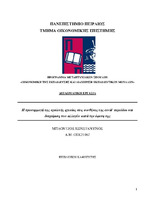Η προσαρμογή της σχολικής ηγεσίας στις συνθήκες της covid περιόδου και διαχείριση των αλλαγών κατά την ύφεση της

View/
Keywords
Διαχείριση κρίσεων ; Πανδημία ; COVID-19 ; Σχολική ηγεσία ; Θετικό σχολικό κλίμα ; Αυτονομία στη λήψη αποφάσεωνAbstract
The purpose of this thesis is to investigate the views of primary education teachers, regarding the role played by the school leader (practices and characteristics) in managing the crisis of the COVID19 pandemic. In addition, teachers' opinions were explored regarding the factors that influenced these practices, as well as the challenges that arise for school leadership, after the return of the educational process to normality. Based on the above stated purpose, a quantitative research was carried out, using a questionnaire as a data collection tool on a sample of 65 primary school teachers. From the processing and analysis of the collected data, it emerged that the practices applied by school leaders to deal with the crisis, are based on the creation of a positive school climate and on flexibility-adaptability and fall into an integration of the school leadership models that have been identified in the literature and more specifically in managerial, directive, participatory, distributed and transformational. At the same time, it emerged that the main characteristics that a school leader must possess, in order to effectively manage this health crisis, are: cooperation, adaptability/flexibility, empathy and speed in decision-making. From the correlation analysis, it emerged that the aforementioned practices are positively related to the formation of a culture of cooperation and a positive school climate on the part of the school leader, and negatively to the low degree of autonomy he has in decision-making. Based on the above, it emerged that the actions that will increase the degree of readiness of the school leader in order to deal with similar crises and that are challenges/suggestions for the Greek education system are the strengthening of his role by providing greater margins of autonomy and his training on issues crisis management.


